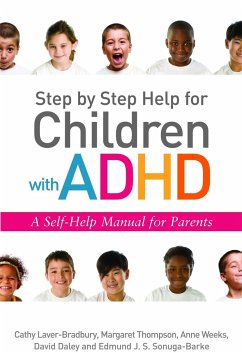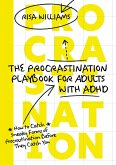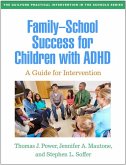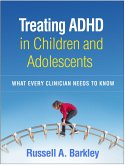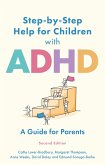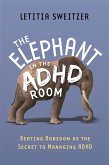David Daley, Cathy Laver-Bradbury, Anne Weeks
Step by Step Help for Children with ADHD
A Self-Help Manual for Parents
24,99 €
inkl. MwSt.
Versandfertig in über 4 Wochen

12 °P sammeln
David Daley, Cathy Laver-Bradbury, Anne Weeks
Step by Step Help for Children with ADHD
A Self-Help Manual for Parents
- Broschiertes Buch
- Merkliste
- Auf die Merkliste
- Bewerten Bewerten
- Teilen
- Produkt teilen
- Produkterinnerung
- Produkterinnerung
This simple, flexible six-step programme is full of tried-and-tested ideas for parents and professionals supporting families of young children with ADHD. The programme includes games that will help improve the child's attention, exercises to develop patience and tips for supporting the child in successful self-organization.
Andere Kunden interessierten sich auch für
![The Procrastination Playbook for Adults with ADHD The Procrastination Playbook for Adults with ADHD]() Risa WilliamsThe Procrastination Playbook for Adults with ADHD21,99 €
Risa WilliamsThe Procrastination Playbook for Adults with ADHD21,99 €![Family-School Success for Children with ADHD Family-School Success for Children with ADHD]() Thomas J. Power (The Children's Hospital of PhiladelphiaFamily-School Success for Children with ADHD49,99 €
Thomas J. Power (The Children's Hospital of PhiladelphiaFamily-School Success for Children with ADHD49,99 €![Treating ADHD in Children and Adolescents Treating ADHD in Children and Adolescents]() Russell A. Barkley (Virginia Commonwealth University School of MediTreating ADHD in Children and Adolescents92,99 €
Russell A. Barkley (Virginia Commonwealth University School of MediTreating ADHD in Children and Adolescents92,99 €![Step-By-Step Help for Children with ADHD Step-By-Step Help for Children with ADHD]() Cathy Laver-BradburyStep-By-Step Help for Children with ADHD22,99 €
Cathy Laver-BradburyStep-By-Step Help for Children with ADHD22,99 €![The Elephant in the ADHD Room The Elephant in the ADHD Room]() Letitia SweitzerThe Elephant in the ADHD Room35,99 €
Letitia SweitzerThe Elephant in the ADHD Room35,99 €![ADHD Girls to Women ADHD Girls to Women]() Lotta Borg SkoglundADHD Girls to Women21,99 €
Lotta Borg SkoglundADHD Girls to Women21,99 €![The Couple's Guide to Thriving with ADHD The Couple's Guide to Thriving with ADHD]() Melissa OrlovThe Couple's Guide to Thriving with ADHD18,99 €
Melissa OrlovThe Couple's Guide to Thriving with ADHD18,99 €-
-
-
This simple, flexible six-step programme is full of tried-and-tested ideas for parents and professionals supporting families of young children with ADHD. The programme includes games that will help improve the child's attention, exercises to develop patience and tips for supporting the child in successful self-organization.
Hinweis: Dieser Artikel kann nur an eine deutsche Lieferadresse ausgeliefert werden.
Hinweis: Dieser Artikel kann nur an eine deutsche Lieferadresse ausgeliefert werden.
Produktdetails
- Produktdetails
- Verlag: Jessica Kingsley Publishers
- Seitenzahl: 160
- Erscheinungstermin: 15. Juli 2010
- Englisch
- Abmessung: 231mm x 154mm x 12mm
- Gewicht: 250g
- ISBN-13: 9781849050708
- ISBN-10: 1849050708
- Artikelnr.: 28897404
- Herstellerkennzeichnung
- Libri GmbH
- Europaallee 1
- 36244 Bad Hersfeld
- gpsr@libri.de
- Verlag: Jessica Kingsley Publishers
- Seitenzahl: 160
- Erscheinungstermin: 15. Juli 2010
- Englisch
- Abmessung: 231mm x 154mm x 12mm
- Gewicht: 250g
- ISBN-13: 9781849050708
- ISBN-10: 1849050708
- Artikelnr.: 28897404
- Herstellerkennzeichnung
- Libri GmbH
- Europaallee 1
- 36244 Bad Hersfeld
- gpsr@libri.de
Cathy Laver-Bradbury, Margaret Thompson, Anne Weeks, David Daley and Edmund J. S. Sonuga-Barke
Part 1: What is ADHD and What Can We Do About It? Chapter 1: Introduction.
What is childhood ADHD? The Six Step Parenting Programme. Understanding
ADHD. Theories as to why children have ADHD. The brain in children with
ADHD. Chapter 2: Parenting a child with ADHD. What can you do to help your
child. Children with ADHD have strength too. Personalizing the steps to
meet your needs. Children with ADHD who are also temperamentally sensitive.
The importance of adapting (tailoring) your parenting. Chapter 3: An
Overview of the Programme. The task and skills used in the programme. What
affects your parenting? Parents with ADHD themselves. The Six Steps:
Overview for parents. Part 2: The Six -Step Parenting Programme. Step 1:
How does ADHD appear in your child? Skills overview for Step 1. Tasks
overview for Step 1. Inital tasks: preparing yourself. Skill 1. Making eye
contact. Skill 2 Recruiting your child's attention before giving
instructions. Skill 3 Listening and helping your child to listen. Skill 4
Notice the good things your child does (catch the good). Skill 5 Be aware
that your child copies you (mirror image). Skill 6 Begin to notice what
your child is able to do (scoping). Skill 7 Remember to speak with respect
to your child. Tasks for Step 1 you need to carry out now. Recap and
review. Step 2: Strategies to help children with ADHD. Skills overview for
Step 2. Remember when changing your approach. Tasks overview for Step 2.
Thinking through how the first step has gone. Skill 1 Scaffolding. Skill 2
Identifying and using teachable moments. Skill 3 Earshotting. Skill 4 How
to adopt a consistent routine. Skill 5 Giving clear boundaries and house
rules. Skill 6 Using countdowns and delay fading. Skill 7 Giving clear
messages. Skill 8 using short sentences. Skill 9 Using choices. Skill 10
Avoiding confrontations and arguments. Skill 11 Keeping calm. Skill 12
Calming you child. Task: using play to help your child's attention and
concentration. The tasks Step 2. Recap and Review. Assessing your child's
abilities. Step 3: Helping your child's attention through play. Skills
overview for Step 3. Tasks overview for Step 3. How have the past two steps
gone? Skill 1 Recognizing the importance of play. Skill 2
Attention-training play. Skill 3 Encouraging listening skills. Skill 4 'We'
and 'I' and tone of voice. Skill 5 Discussion of emotions and extending
your child's langauge. Skill 6 Choices revisited. Tasks for step 3. Recap
and Review. Step 4: Improving your child's communication. Skills overview
for Step 4. Tasks overview for Step 4. Skill 1 Expanding your child's
language through play. Skill 2 Working on tone of voice. Skill 3 Setting
clear goals and expectations. Skill 4 Temper tantrums and distraction
techniques. Skill 5 Anticipation. Skill 6 Quiet time. Skill 7 Time out.
Skill 8 Cueing your child to tasks and changes of task. Skill 9 Coping with
delay. Skill 10 Talking about and showing feelings. Task for step 4. Recap
and Review. Step 5: Managing your ADHD child outside of the home. Skills
overview for Step 5. Tasks overview for Step 5. Parent checklist - self
monitoring Skill 1 Listening, sharing feelings and mutal respect. Skill 2
Extending the use of timers. Skill 3 Calming your child outside the home.
Skill 4 More on earshotting. Skill 5 Repetition of instructions. Skill 6
House rules and the outside world. Skill 7 Rewards. Skill 8 Teachable
moments in depth. tasks for Step 5. Parents with symptoms of ADHD
themselves. Recap and review. Step 6: Times Ahead. Skills overview for Step
6. Tasks overview for Step 6. Introduction to Step 6. Skill 1 How to cope
during difficult times. Skill 2 Seeking help when you need it. Tasks for
Step 6. To conclude: general hints and tips. Resources. Practice scenarios.
Review sheet. Parents' checklist for self-monitoring. Further information
about ADHD.
What is childhood ADHD? The Six Step Parenting Programme. Understanding
ADHD. Theories as to why children have ADHD. The brain in children with
ADHD. Chapter 2: Parenting a child with ADHD. What can you do to help your
child. Children with ADHD have strength too. Personalizing the steps to
meet your needs. Children with ADHD who are also temperamentally sensitive.
The importance of adapting (tailoring) your parenting. Chapter 3: An
Overview of the Programme. The task and skills used in the programme. What
affects your parenting? Parents with ADHD themselves. The Six Steps:
Overview for parents. Part 2: The Six -Step Parenting Programme. Step 1:
How does ADHD appear in your child? Skills overview for Step 1. Tasks
overview for Step 1. Inital tasks: preparing yourself. Skill 1. Making eye
contact. Skill 2 Recruiting your child's attention before giving
instructions. Skill 3 Listening and helping your child to listen. Skill 4
Notice the good things your child does (catch the good). Skill 5 Be aware
that your child copies you (mirror image). Skill 6 Begin to notice what
your child is able to do (scoping). Skill 7 Remember to speak with respect
to your child. Tasks for Step 1 you need to carry out now. Recap and
review. Step 2: Strategies to help children with ADHD. Skills overview for
Step 2. Remember when changing your approach. Tasks overview for Step 2.
Thinking through how the first step has gone. Skill 1 Scaffolding. Skill 2
Identifying and using teachable moments. Skill 3 Earshotting. Skill 4 How
to adopt a consistent routine. Skill 5 Giving clear boundaries and house
rules. Skill 6 Using countdowns and delay fading. Skill 7 Giving clear
messages. Skill 8 using short sentences. Skill 9 Using choices. Skill 10
Avoiding confrontations and arguments. Skill 11 Keeping calm. Skill 12
Calming you child. Task: using play to help your child's attention and
concentration. The tasks Step 2. Recap and Review. Assessing your child's
abilities. Step 3: Helping your child's attention through play. Skills
overview for Step 3. Tasks overview for Step 3. How have the past two steps
gone? Skill 1 Recognizing the importance of play. Skill 2
Attention-training play. Skill 3 Encouraging listening skills. Skill 4 'We'
and 'I' and tone of voice. Skill 5 Discussion of emotions and extending
your child's langauge. Skill 6 Choices revisited. Tasks for step 3. Recap
and Review. Step 4: Improving your child's communication. Skills overview
for Step 4. Tasks overview for Step 4. Skill 1 Expanding your child's
language through play. Skill 2 Working on tone of voice. Skill 3 Setting
clear goals and expectations. Skill 4 Temper tantrums and distraction
techniques. Skill 5 Anticipation. Skill 6 Quiet time. Skill 7 Time out.
Skill 8 Cueing your child to tasks and changes of task. Skill 9 Coping with
delay. Skill 10 Talking about and showing feelings. Task for step 4. Recap
and Review. Step 5: Managing your ADHD child outside of the home. Skills
overview for Step 5. Tasks overview for Step 5. Parent checklist - self
monitoring Skill 1 Listening, sharing feelings and mutal respect. Skill 2
Extending the use of timers. Skill 3 Calming your child outside the home.
Skill 4 More on earshotting. Skill 5 Repetition of instructions. Skill 6
House rules and the outside world. Skill 7 Rewards. Skill 8 Teachable
moments in depth. tasks for Step 5. Parents with symptoms of ADHD
themselves. Recap and review. Step 6: Times Ahead. Skills overview for Step
6. Tasks overview for Step 6. Introduction to Step 6. Skill 1 How to cope
during difficult times. Skill 2 Seeking help when you need it. Tasks for
Step 6. To conclude: general hints and tips. Resources. Practice scenarios.
Review sheet. Parents' checklist for self-monitoring. Further information
about ADHD.
Part 1: What is ADHD and What Can We Do About It? Chapter 1: Introduction.
What is childhood ADHD? The Six Step Parenting Programme. Understanding
ADHD. Theories as to why children have ADHD. The brain in children with
ADHD. Chapter 2: Parenting a child with ADHD. What can you do to help your
child. Children with ADHD have strength too. Personalizing the steps to
meet your needs. Children with ADHD who are also temperamentally sensitive.
The importance of adapting (tailoring) your parenting. Chapter 3: An
Overview of the Programme. The task and skills used in the programme. What
affects your parenting? Parents with ADHD themselves. The Six Steps:
Overview for parents. Part 2: The Six -Step Parenting Programme. Step 1:
How does ADHD appear in your child? Skills overview for Step 1. Tasks
overview for Step 1. Inital tasks: preparing yourself. Skill 1. Making eye
contact. Skill 2 Recruiting your child's attention before giving
instructions. Skill 3 Listening and helping your child to listen. Skill 4
Notice the good things your child does (catch the good). Skill 5 Be aware
that your child copies you (mirror image). Skill 6 Begin to notice what
your child is able to do (scoping). Skill 7 Remember to speak with respect
to your child. Tasks for Step 1 you need to carry out now. Recap and
review. Step 2: Strategies to help children with ADHD. Skills overview for
Step 2. Remember when changing your approach. Tasks overview for Step 2.
Thinking through how the first step has gone. Skill 1 Scaffolding. Skill 2
Identifying and using teachable moments. Skill 3 Earshotting. Skill 4 How
to adopt a consistent routine. Skill 5 Giving clear boundaries and house
rules. Skill 6 Using countdowns and delay fading. Skill 7 Giving clear
messages. Skill 8 using short sentences. Skill 9 Using choices. Skill 10
Avoiding confrontations and arguments. Skill 11 Keeping calm. Skill 12
Calming you child. Task: using play to help your child's attention and
concentration. The tasks Step 2. Recap and Review. Assessing your child's
abilities. Step 3: Helping your child's attention through play. Skills
overview for Step 3. Tasks overview for Step 3. How have the past two steps
gone? Skill 1 Recognizing the importance of play. Skill 2
Attention-training play. Skill 3 Encouraging listening skills. Skill 4 'We'
and 'I' and tone of voice. Skill 5 Discussion of emotions and extending
your child's langauge. Skill 6 Choices revisited. Tasks for step 3. Recap
and Review. Step 4: Improving your child's communication. Skills overview
for Step 4. Tasks overview for Step 4. Skill 1 Expanding your child's
language through play. Skill 2 Working on tone of voice. Skill 3 Setting
clear goals and expectations. Skill 4 Temper tantrums and distraction
techniques. Skill 5 Anticipation. Skill 6 Quiet time. Skill 7 Time out.
Skill 8 Cueing your child to tasks and changes of task. Skill 9 Coping with
delay. Skill 10 Talking about and showing feelings. Task for step 4. Recap
and Review. Step 5: Managing your ADHD child outside of the home. Skills
overview for Step 5. Tasks overview for Step 5. Parent checklist - self
monitoring Skill 1 Listening, sharing feelings and mutal respect. Skill 2
Extending the use of timers. Skill 3 Calming your child outside the home.
Skill 4 More on earshotting. Skill 5 Repetition of instructions. Skill 6
House rules and the outside world. Skill 7 Rewards. Skill 8 Teachable
moments in depth. tasks for Step 5. Parents with symptoms of ADHD
themselves. Recap and review. Step 6: Times Ahead. Skills overview for Step
6. Tasks overview for Step 6. Introduction to Step 6. Skill 1 How to cope
during difficult times. Skill 2 Seeking help when you need it. Tasks for
Step 6. To conclude: general hints and tips. Resources. Practice scenarios.
Review sheet. Parents' checklist for self-monitoring. Further information
about ADHD.
What is childhood ADHD? The Six Step Parenting Programme. Understanding
ADHD. Theories as to why children have ADHD. The brain in children with
ADHD. Chapter 2: Parenting a child with ADHD. What can you do to help your
child. Children with ADHD have strength too. Personalizing the steps to
meet your needs. Children with ADHD who are also temperamentally sensitive.
The importance of adapting (tailoring) your parenting. Chapter 3: An
Overview of the Programme. The task and skills used in the programme. What
affects your parenting? Parents with ADHD themselves. The Six Steps:
Overview for parents. Part 2: The Six -Step Parenting Programme. Step 1:
How does ADHD appear in your child? Skills overview for Step 1. Tasks
overview for Step 1. Inital tasks: preparing yourself. Skill 1. Making eye
contact. Skill 2 Recruiting your child's attention before giving
instructions. Skill 3 Listening and helping your child to listen. Skill 4
Notice the good things your child does (catch the good). Skill 5 Be aware
that your child copies you (mirror image). Skill 6 Begin to notice what
your child is able to do (scoping). Skill 7 Remember to speak with respect
to your child. Tasks for Step 1 you need to carry out now. Recap and
review. Step 2: Strategies to help children with ADHD. Skills overview for
Step 2. Remember when changing your approach. Tasks overview for Step 2.
Thinking through how the first step has gone. Skill 1 Scaffolding. Skill 2
Identifying and using teachable moments. Skill 3 Earshotting. Skill 4 How
to adopt a consistent routine. Skill 5 Giving clear boundaries and house
rules. Skill 6 Using countdowns and delay fading. Skill 7 Giving clear
messages. Skill 8 using short sentences. Skill 9 Using choices. Skill 10
Avoiding confrontations and arguments. Skill 11 Keeping calm. Skill 12
Calming you child. Task: using play to help your child's attention and
concentration. The tasks Step 2. Recap and Review. Assessing your child's
abilities. Step 3: Helping your child's attention through play. Skills
overview for Step 3. Tasks overview for Step 3. How have the past two steps
gone? Skill 1 Recognizing the importance of play. Skill 2
Attention-training play. Skill 3 Encouraging listening skills. Skill 4 'We'
and 'I' and tone of voice. Skill 5 Discussion of emotions and extending
your child's langauge. Skill 6 Choices revisited. Tasks for step 3. Recap
and Review. Step 4: Improving your child's communication. Skills overview
for Step 4. Tasks overview for Step 4. Skill 1 Expanding your child's
language through play. Skill 2 Working on tone of voice. Skill 3 Setting
clear goals and expectations. Skill 4 Temper tantrums and distraction
techniques. Skill 5 Anticipation. Skill 6 Quiet time. Skill 7 Time out.
Skill 8 Cueing your child to tasks and changes of task. Skill 9 Coping with
delay. Skill 10 Talking about and showing feelings. Task for step 4. Recap
and Review. Step 5: Managing your ADHD child outside of the home. Skills
overview for Step 5. Tasks overview for Step 5. Parent checklist - self
monitoring Skill 1 Listening, sharing feelings and mutal respect. Skill 2
Extending the use of timers. Skill 3 Calming your child outside the home.
Skill 4 More on earshotting. Skill 5 Repetition of instructions. Skill 6
House rules and the outside world. Skill 7 Rewards. Skill 8 Teachable
moments in depth. tasks for Step 5. Parents with symptoms of ADHD
themselves. Recap and review. Step 6: Times Ahead. Skills overview for Step
6. Tasks overview for Step 6. Introduction to Step 6. Skill 1 How to cope
during difficult times. Skill 2 Seeking help when you need it. Tasks for
Step 6. To conclude: general hints and tips. Resources. Practice scenarios.
Review sheet. Parents' checklist for self-monitoring. Further information
about ADHD.
